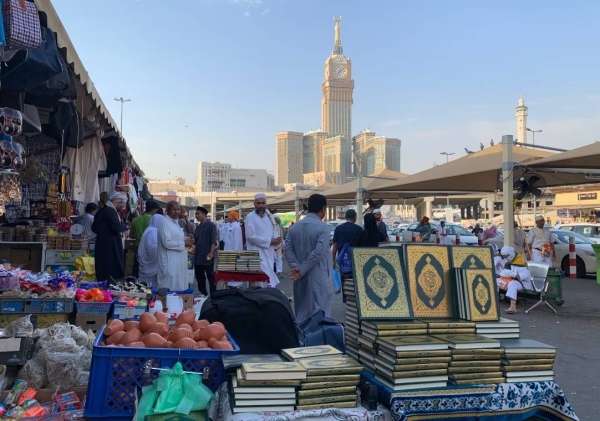Every year during the Hajj pilgrimage, pilgrims flock to the holy cities of Makkah and Madinah in search of souvenirs to commemorate their spiritual journey. These keepsakes serve as cherished reminders of their “journey of a lifetime” and symbolize their connection to Islamic rituals. The market for gifts and souvenirs purchased by visitors to the Holy Mosque is estimated at SR30 billion during the period from Ramadan to the end of Dhu al-Hijjah.
Among the most popular items sought after by pilgrims are prayer beads, prayer rugs, and Zamzam water. These symbolic items hold deep significance in Islamic rituals and are commonly found around the two holy mosques. Additionally, fragrant products with oriental scents such as oud oil, blended perfumes, musk, amber, incense, henna, and other aromatic items are also in high demand.
For those looking for easily transportable gifts, copper accessories inscribed with religious phrases, Quranic verses, prayers, or the 99 names of Allah are a popular choice. Religious gifts, such as locally printed Qur’ans from the King Fahd Complex for the Printing of the Holy Qur’an and small bottles of Zamzam water sourced from Makkah, are also highly favored by pilgrims. These gifts not only serve as mementos but also as tokens of their spiritual journey.
The tradition of acquiring symbolic keepsakes and bringing back gifts from the holy cities is deeply ingrained among pilgrims to the Holy Mosque. Since the pilgrimage is a once-in-a-lifetime journey for most Muslims, they seek to document it by collecting mementos that they can treasure forever. These gifts also serve as a way to share the experience of Hajj with loved ones back home and to spread the blessings of the holy pilgrimage.
The Tourism and Travel Investment Forum estimates that the market for gifts and souvenirs during the Hajj period is a significant contributor to the local economy, with pilgrims spending billions of riyals on these items. This influx of revenue benefits local businesses and vendors, who cater to the needs and preferences of pilgrims by offering a wide variety of gifts and souvenirs that cater to their spiritual and cultural interests.
Overall, the tradition of acquiring gifts and keepsakes during the Hajj pilgrimage is deeply rooted in the spiritual experience of the journey. These gifts not only serve as tangible reminders of the pilgrimage but also as tokens of faith and blessings that pilgrims carry back with them to their homes. The market for gifts and souvenirs in the holy cities of Makkah and Madinah continues to thrive, fueled by the spiritual significance and cultural importance of these symbolic items.











